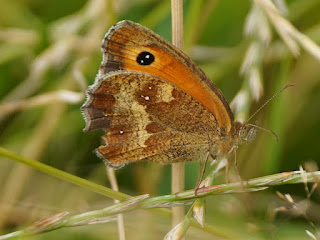The invading Mute Swans from the Serpentine continue to advance up the Long Water, and had brought their five cygnets well past the Vista.
Rival males had a brief fight before going back to the usual threat display cruising side by side with wings raised.
But these weren't the male invader versus the resident male. It was, I think, the resident male attacking another swan that had strayed on to the lake, to show how tough he was. He daren't attack the invader, who is the terror of the lake -- and was not impressed, calmly preening on the edge.
Mute cygnets are not mute at all: they are quite noisy, squeaking plaintively.
Also at the Vista, a pair of Greylag Geese had a faceoff with one of the resident Moorhens. The cause of the dispute was a tiny amount of oatmeal on the kerb.
The female Mallard by the Triangle car park is now down to her last duckling.
There was a slightly better view of the Great Crested Grebe on the nest by the bridge.
I now haven't seen the grebes with chicks for two days running. I don't think this is necessarily bad news, as if they had lost the chicks we would have seen them alone. Probably they have just found a good place to lurk in shelter.
The old Grey Heron by the Henry Moore sculpture was enjoying a good scratch.
There was just enough sunshine to encourage a Feral Pigeon to bask ...
... but the Little Owls at the exposed Round Pond were staying indoors. The female looked out of the back entrance of the nest tree.
The female at the Serpentine Gallery could just be seen through a gap in the leaves of the lime tree.
The male Peregrine on the tower had an almighty yawn.
A Reed Warbler below the Italian Garden was feeding chicks, and kept coming out of the reeds to catch insects for them.
A Gatekeeper butterfly perched in the long grass near the Round Pond, the first one I've seen this year.
Buddleia is sometimes called 'butterfly bush', and indeed butterflies love it. Here are a Red Admiral and a Meadow Brown on the same flower head.
A clump of Scarlet Beebalm in the Rose Garden lived up to its name by attracting Common Carder bees. There were at least a dozen climbing all over it.












In Italian it's called Butterfly Tree. I haven't commented for ages...
ReplyDeleteTheodore
It avoids having the use the bizarre name 'buddleia', apparently named after the Reverend Adam Buddle (1662–1715).
DeleteInteresting. It's also called Butterfly bush in English, at least by me sometimes... but I think I've heard others refer to it thus
DeleteI love the Moorhens bravery here! With 2 vs 1.
ReplyDeleteSean
Burning question by the way! Who got the oatmeal!??…
ReplyDeleteSean
Both, eventually.
DeleteI'm impressed by the Moorhen standing up to two Greylags! Had it been two Canadas it ought to receive the order of courage.
ReplyDeleteI take it that the invading force are showing the ropes and the tricks of the trade to their cygnets, so that they will become proper little violent swans.
Tinúviel
Those cygnets are already pecking geese. Last year's were also horrible. Both nature and nurture at work here, I think.
DeleteComforting thought that some things never change.
DeleteTinúviel
Lovely shot of the Reed Warbler.
ReplyDeleteI was really surprised by the fact that was your first Gatekeeper as everywhere I've been recently it's been so abundant- either the commonest or second commonest (after Meadow Brown) butterfly species. See about 6 in the garden most days. I didn't realise it was still that scarce in the inner parks!
For some reason Gatekeepers seem to be relatively few in the park, vastly outnumbered by Meadow Browns. I think I can tell them apart in flight, as Gatekeepers look more orange.
Delete(posting here because it doesn't allow me to post in today's entry)
ReplyDeleteIt's amazing that the tiny little Grebes should be swimming around like pros almost the same instant they leave the protection of the eggshell. Adorable little burdens on their parents' backs.
Those sparrows were the definition of cheek. They gobbled up potato chips and carried out generally like miniature gulls.
Tinúviel
The word is 'precocial' -- they're hatched in quite a developed state. The opposite is 'altricial', hatched naked and blind, like songbird chicks.
Delete